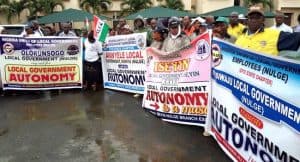
Cash dollars in various denominations on the plane.
In the quest to shield local industries, governments often resort to market protectionism, a practice that imposes barriers to free trade. While the intention might be to foster local production and safeguard jobs, the adverse effects often outweigh the purported benefits, as exemplified by the Central Bank of Nigeria’s (CBN) recent retraction of its forex restrictions policy.
The CBN, back in 2015, restricted access to foreign exchange for 43 categories of items, a policy aimed at promoting the local production of these goods. However, as time unfolded, the adverse repercussions began to surface, painting a vivid picture of how market protectionism could, in reality, be a double-edged sword.
Just like any other protectionist policy, this meddling quickly spiraled out of control. The restriction led to a surge in the demand for Forex in the parallel market, causing a depreciation of the parallel-market exchange rate and escalating prices. The divergence in rates between the official window and the parallel market became a persistent issue, rendering the Forex market somewhat dysfunctional.
Why is this so, in simple terms?
Importers resorted to the parallel market to source Forex, which further pressured the Naira. Additionally, between 2016 and 2022, Nigerians imported nine itemsworth N18 trillion from the Forex ban list, indicating a substantial demand for these restricted items despite the policy.
The restricted access to forex drove importers to the parallel market where the exchange rate was higher, leading to increased costs of importing essential goods. These increased costs were, in turn, transferred to consumers in the form of higher retail prices, mounting inflation on the price of goods.
The CBN admitted to its error when it said “the hitherto FX restrictions had implications on inflation, causing the prices of affected goods to increase.”
But that’s not the end.
The policy meant to protect local industries ended up creating a harsher business environment. The high cost of imported inputs, due to the forex restrictions, escalated production costs for local industries, many of which depended on imported raw materials.
So, acknowledging the market distortions and the adverse effects of the restrictions on prices and the parallel-market exchange rate, CBN decided to lift the restrictions last week.
What’s next after lifting the ban?
- The CBN aims to increase the flow of money in the foreign exchange (forex) market, making it easier for businesses and individuals to buy and sell foreign currencies like dollars. This is like having more water in a river, allowing boats to move freely.
- By reducing the demand for dollars in the unofficial market, the CBN hopes to keep the price of dollars more stable. This means fewer fluctuations, making it fairer and predictable for everyone.
- Easing forex restrictions allows local businesses to buy necessary materials from other countries at better rates. This could lead to lower production costs, which might result in lower prices for consumers.
- If local factories can access what they need at better prices, they might produce more and hire more people, creating more job opportunities.
- With steadier exchange rates and lower production costs, prices of goods in the market tend to become more stable, preventing sudden price hikes that hurt the pocket.
The policy reversal is not only a rectification of a past error but a significant stride towards fostering a market-driven economy. It sends a strong message against market protectionism, underscoring the importance of allowing market forces to naturally dictate the economic trajectory, while the government plays a facilitating rather than a restrictive role.
Dear Advocate of Reasoning, If there’s any lesson we have learnt from this, it is the danger of the government meddling into the economy. Because every time it does, it hurts the market and people suffer.







